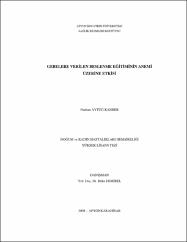| dc.contributor.advisor | Demirel, Reha | |
| dc.contributor.author | Aytuğ Kanber, Nurhan | |
| dc.date.accessioned | 2015-04-07T10:57:26Z | |
| dc.date.available | 2015-04-07T10:57:26Z | |
| dc.date.issued | 2008 | |
| dc.date.submitted | 2008 | |
| dc.identifier.citation | Aytuğ Kanber, Nurhan. Gebelere Verilen Beslenme Eğitiminin Anemi Üzerine Etkisi. Afyonkarahisar: Afyon Kocatepe Üniversitesi,2008. | en_US |
| dc.identifier.uri | http://hdl.handle.net/11630/3693 | |
| dc.description.abstract | Gebelik döneminde görülen anemi hem anne saglıgını hem de bebeğin sağlığını etkilemekte ve demir eksikliği anemisinin (DEA) en sık sebebi nütrisyonel eksikliktir. Araştırma demir eksikliği anemisinin önlenmesinde beslenme eğitiminin etkisini belirlemek amacıyla yapıldı.
Araştırmaya toplam 60 gebe alındı, bunlar randomize olarak 30’u eğitim grubu (EG) 30’u da kontrol grubu (KG) olarak belirlendi. Tüm gebelere 3. ve 9. Aylarında katılımcıların sosyo-demografik özellikleri ve bilgi düzeylerini içeren anket formu uygulandı ve Hemoglobin (Hb) degerleri kaydedildi. EG gebelerine 3. Aylarında beslenme egitimi verildi ve bu gebelere ayda bir beslenmelerine dikkat etmesi gereken konular hatırlatıldı. Verilerin analizinde Ki-kare, Mann-Whitney U ve Wilcoxon testleri kullanıldı. Gebeliğin 3. ayında EG’nun Hb degeri ortalama 12,5±1g/dL, KG’nun 12,6±1,0g/dL idi (P=0,893). Gebeliklerinin baslangıçlarından itibaren EG’nun ortalama 12,4±3,8, KG’nun ise ortalama 12,7±3,1 kilo aldıkları (P=0,797) ve her iki gruptaki gebelerin yaklasık yarısının alması gerekenden az/çok kilo aldıkları görüldü
(P=0,795). Ögün aralarında EG gebelerinin 3. ayda %33,3 oranında çay içtikleri, 9. ay’da çay tüketiminin %13,3’lere düstügü ve farkın anlamlı oldugu (P=0,034), KG’nda ise fark olmadıgı görüldü (P=0,257). Kahvaltıda KG gebeleri %86,7 oranında çay içerken, EG gebelerinin %60,0 oranında çay içtikleri ve aralarında ki farkın anlamlı oldugu saptandı (P=0,021). EG’ndaki gebelerin beslenme ile ilgili bilgi düzeylerinde artıs olurken (P<0,001) KG’nda fark saptanmadı (P=0,850). Gebeligin 9. ayında gebelerin Hb’lerindeki azalmalarına bakıldığında EG’nda ortalama 0,6±1,1g/dL, KG’nda 0,8±1,5g/dL’lik düşme olduğu ancak gruplar arasında Hb’deki azalma açısından fark bulunmadığı görüldü (P=0,387). Gebelikte verilen eğitimin gebelerin bilgi düzeyi üzerine önemli derecede etkisi olduğu ancak anemi gelişimini engelleme de yetersiz kaldığı görüldü. | en_US |
| dc.description.abstract | Anemia seen during the period of gestation affects the health of the mother as well fetus. This investigation was carried out to determine the effect of nutritional training for the prevention of anemia due to iron defiency. A total of 60 pregnant women were enrolled in the study. They were then divided into two groups as ''Training group'' (TG) and ''Control Group'' (CG)
randomly each having 30 people. A nutritional training were given to the pregnant women in the TG when they are in the 3rd monts of their pregnancy and the outlinens of the nutrition were reminded them once a month later. A questionnaire during the 3rd and 9th month of pregnancy to ascertain the participants' sociodemographik features and level of knowledge. To analyze the data chi-square, Mann- Whitney U and Wilcoxon tests were used. During the 3rd month of gestation, the mean values for Hb was 12.5±1,6gr/dL in TG and 12,6±1,0gr/dL in CG (P=0,893). Starting from the beginning of the pregnancy, the mean value of weight gain in TG was 12,4±3,8 kilos in CG giving a P value of (P=0,797) and also it was observed that about half of the pregnant women had a less/more kilos than the expected in each group (P=0,795). While the pregnant women in group TG were recorded to have drunk tea as 33,3% between the meals during the 3rd month, this rate of tea consumption was reduced to 13,3% at the 9th month showing a ststistical significance (P=0,034); whereas the difference for the tea
consumption was not seen in the other group (CG) with a P value of (P=0,257). For breakfast, the pregnant women in CG was determined to have drunk tea as 86,7% , as this rate was 60,0% for the TG showing again a significant difference (P=0,021). In addition, it was also seen an increase in the level of nutritional knowledge for the women in the TG (P<0,001), while there was not any significant difference in the other group (CG) with a P value of (P=0,850). When the decrease in the Hb is considered during the 9th month of pregnancy, 0,6±1,1g/dL reduction was observed in group TG and 0,8±1,5g/dL in CG group on average. However, there was not any significant difference in terms of decrease in Hb level in group TG versus group EG (P=0,387). It was observed that the training given to the pregnant women had a positive effect on their level of knowledge, whereas it was not sufficient to prevent anemia. | en_US |
| dc.language.iso | tur | en_US |
| dc.publisher | Afyon Kocatepe Üniversitesi, Sağlık Bilimleri Enstitüsü | en_US |
| dc.rights | info:eu-repo/semantics/openAccess | en_US |
| dc.subject | Anemi | en_US |
| dc.subject | Beslenme | en_US |
| dc.subject | Demir eksikligi | en_US |
| dc.subject | Eğitim | en_US |
| dc.subject | Gebelik. | en_US |
| dc.title | Gebelere Verilen Beslenme Eğitiminin Anemi Üzerine Etkisi | en_US |
| dc.title.alternative | Determination of Nutritıional Training for The Prevention of Anemia on Pregnant Women | en_US |
| dc.type | masterThesis | en_US |
| dc.department | Afyon Kocatepe Üniversitesi, Sağlık Bilimleri Enstitüsü, Hemşirelik Bölümü | en_US |
| dc.relation.publicationcategory | Tez | en_US |



















